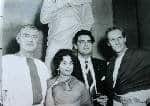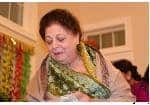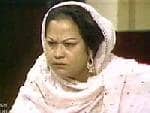Sabiha Khanum Pakistani actress
Sabiha Khanum born Mukhtar Begum, 16 October, 1935, Gujrat is a Pakistani film actress. She was the leading star of Pakistani cinema in the 1950s and 1960s. She would continue to play successful character roles later in life.Most of Sabiha’s movies were with her husband, the late Santosh Kumar (Musa Raza). Sabiha and Santosh were highly regarded as performers, and movie-goers loved to see them together.
Early life
Mukhtar Begum is the daughter of Mohammad Ali (Maahia) from Dehli and Iqbal Begum (Baalu) from Amritsar, Punjab, India. She was raised in a conservative rural environment by her grandparents, but got her first acting opportunity on stage in Lahore, after moving there to be with her father.
A cultural delegation visited a cinema house in Sialkot, Pakistan in 1948. Mukhtar Begum, who was part of the delegation, sang the Punjabi song “Kithay gae yoon pardesia way” from the film Sassi Punnoon (which starred Baalu and Aslam). The performance was praised, and soon Mohammad Ali introduced his daughter to a noted stage drama writer and poet, Nafees Khaleeli. Noting her determination, Khaleeli offered her a role in the drama But shikan, which she accepted. Nafees Khaleeli gave her the screen name of Sabiha Khanum.
Career
On Nafees Khaleeli’s request, the film director Masood Pervez offered her a role in the film Beli, giving Sabiha her debut as a film actress in 1948. Beli was also the first film of Masood Pervez as director; the cast was Santosh, Shaheena and Sabiha.
Next Sabiha played the role of ‘Noori’ in famous director/producer Anwar Kamal Pasha’s silver jubilee film Do aansoo, starring Santosh, Gulshan Ara and Sabiha. Do aansoo takes a realistic approach to the tragedy both in scenery and characterization. The film was the crowning achievement of the then movie crew.
Sabiha gained immense prominence in her next movie Aaghosh, Direced by Murtaza Jilani, starring Santosh, Sabiha, and Gulshan Ara. The secret of Sabiha’s success in the Pakistani cinema includes flexibility, rooted in love and understanding, in addition to the fact that she is an embodiment of courage, kindness and decency. In the annals of Pakistani film industry, she dazzled cine-goers in the 1950s. Her role, in the film ‘Ghulam’, released in 1953, directed by Anwar Kamal Pasha, with Santosh was excellent. Her motivation was always clear and resolute. Directors admired her ability to improvise because she was unquestionably talented and irrepressibly ambitious.
Role in the film Nam gum caliber is a testament to her wonderful art. The film was directed by Anwar Kamal Pasha, starring Seema, Sudhir and morning. This film is a parable about a girl was mentally retarded, smartly dubbed by Sabiha, is fun to watch. Moreover, an interesting story actually carries the movie until the end.
Has increased the reputation of the high level achieved in the morning of the 1950s and 1960s as an actress are multiple. Played the role of “Nooran” in Punjabi romantic film, directed by MS Dar. Dula Bhatti her character in the film is, in fact, a feat of age.
Was cast on the morning of the opposite of all actors famous at the time. However, it will be remembered for most of her films with Santosh Kumar. Along the way, I found the love of her life – Santosh Kumar. Has married once, and a great future together, and the fate of the shower, which couples the film is very small.
Movie-goers were treated to a succession of films about popular romance like the film Wada (Sabiha,Santosh). This film was followed by another spate of magnificent movies, which provided countless hours of pleasure to millions of their fans. Paasbaan, Sheikh Chilli, Aas paas, Sassi, Sohni, Choti begum, Daata, Hatim, Aaj kal, Dil mein tu, Ayaz, Mehfil, Pervaaz, Tufaan, and Pholay Khan are a few names to mention.
The push to reach the zenith did fire her imagination since her earlier days. Her genius in succeeding was largely based on character-patience, self-discipline, rationality and inner resolve. Moreover, her independence of mind and ability to focus on her work also served her well.
Sabiha’s achievement along with Santosh Kumar in the following films is still a worthy yardstick: Saat lakh, Darbar, Sardar, Saltanat, Mukhra, Muskurahat, Rishta, Hasrat, Ishrat, Shikwa, Teray baghair, Mauseeqar, Dulhan, Kaneez, Dewar bhabi, Shaam dhalay, Shahenshah Jehangir, Pak daman, Anjuman, Sarfarosh, Inteqaam, Qatil, Sawaal, Commander, and Mohabbat.
Sabiha Khanum: Pakistan’s first leading lady
She was the quintessential first lady of Pakistani cinema and during the 1950s and 1960s,Actor Sabiha Khanum became one of Pakistan’s most sought after leading women.
The Ali Auditorium in Lahore witnessed a remarkable tribute to the singer cum actor organised by the Shakir Ali Museum and Pakistan National Council of the Arts (PNCA). Several leading personalities from the entertainment industry, who had worked and closely followed Khanum’s career, were also present on the occasion to shed light on her illustrious career.
Khanum, dressed in a black sari, entered the auditorium to a swarm of photographers and fans. The frail 75-year-old lady, returning to Pakistan after a long time stay in the US, seemed in a cheerful mood.
Former PNCA Director General Naeem Tahir recalled the vibrant impact of Khanum on contemporary actors due to her skills and technique. “Her contribution to film industry is very important because she did films at a time when the industry was struggling,” said Tahir. “She was always a fighter who could improvise when the times were rough, by moving abroad she had to give up a lot of the things she loved.”
Her unparalleled performance in innumerable movies is classic characterizations which viewers watch with glee to this day. Her role in the film Anjuman was not only unique for her, but a real life test of integrity as well. Confidence in one’s own judgment, she realized early on, is what matters most. She won the hearts of her fans with her role in the following films: Director Hasan Tariq’s films Tehzeeb and Ik gunah aur sahi, Director Zia Sarhadi’s film Rah guzar, Director Zahoor Raja’s film Deewana and Director Jameel Akhtar’s film Aik Raat.
Won the morning, the First Lady of Pakistani silver screen, the pride of performance award from the Pakistani government, and was lit up her face with a smile. Her look is simple and that in each place so simply. To talk in the twenty-century atheist to consider is the style and content of a graceful lady who knows the two generations. Brought her four decades of outstanding work in the cinema of Pakistan’s many glories almost everywhere. Her smile bright is talking about in many ways. He also appeared in dramas from Karachi and Lahore television stations. They imagine wit and wisdom of homespun ordinary Pakistanis. The brand of patriotism and her down home style, attractive and wide.
The following two national songs, which she sang, sparked patriotism, renewed inspiration and symbolized in today’s terms the Pakistani dream of human achievement and the unrelenting march toward betterment:
Sohni dharti Allah rakhay qadam qadam aabad tujhay
Jug jug jeeye mera pyara watan, lub pay dua hai dil mein lagun
In Anwar Maqsood’s stage show, Silver Jubilee, she rendered the following song Yaad karoon tujhay sham saweray from the film Mauseeqar. As the final lyrics faded away that evening, the audience stood and applauded, paying her great tribute. Though most of the people, belonging to that ‘nostalgic era’ are now dead but her performance in the films speaks volumes.
Sabiha, who has been in the public eye for four decades, at last retired, and now lives with her eldest daughter in U.S.A. Her son and the youngest daughter are also settled there.
Awards
Sabiha Khanum has won several Nigar awards:
Best actress for the film Saat lakh in 1957
Best actress for the film Shikwa in 1963
Best actress for the film Dewar bhabi in 1967
Best actress for the film Ik gunah aur sahi in 1975
Special award for her thirty years of acting career in 1981
Best supporting actress in director Hasan Tariq’s film Sungdil in 1982
Sabiha Khanum Pictures
|
|
|











